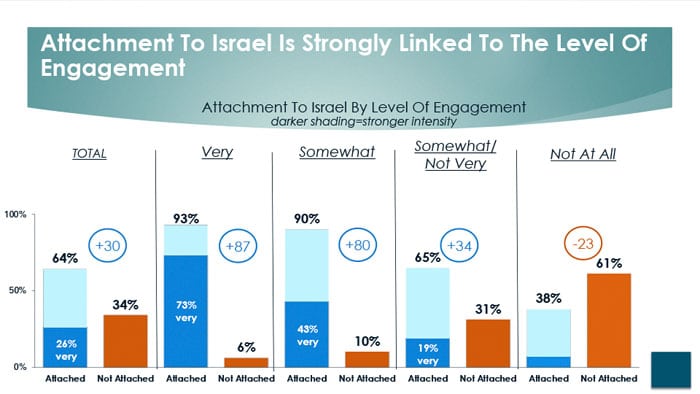 by IAISI/Getty Images
by IAISI/Getty Images 1. Antisemitism
The past week was the Antisemitism Week. A week that began with a devastating attack on a synagogue in Texas, continued with expressions of panic by some of America’s most prominent writers, continued a little longer with a flood of research and surveys for International Holocaust Remembrance Day. Israel’s Ministry of Diaspora submitted a report on the state of antisemitism. The Ruderman Foundation has published a survey that included several questions on antisemitism. The overall picture is somewhat depressing. Antisemitism has been with us for two thousand years, or more, and is still here. If anyone dared dream that it was over, the time for sobriety has come. Zionism did not abolish antisemitism when it normalized the Jewish nation. America did not abolish antisemitism when it was built on a tradition of religious tolerance. Sad, but it is what it is.
One in four Jews in America experienced some form of antisemitism; almost one in two knows someone who had such experience. What is the meaning of “experienced”? For one it is a slur on the street, for another on Twitter, for yet another graffiti on a wall, for a few it is a punch. Antisemitism, like Omicron, is contagious, and one should not take lightly the ugly effects of hatred. And yet it is worth keeping things in proportion: not every hint of hostility is an event worth paying attention to. Jews are not killed or wounded of physically harmed in America as a matter of routine. The growing — and understandable — fear is, among other things, the result of convenience and indulgence: Jews have become accustomed to living with almost no antisemitism, and now need to re-accustom to its presence.
2. Community Connection
The interesting data from the Ruderman Foundation’s study (collected by the Melman Group) is not about antisemitism. It is about the Jewish community. Only about half of American Jews (52%) say that having a connection to the Jewish community is important. Only for one-fifth (20%) is it very important. Younger Jews under the age of forty, those who are more Orthodox as well as more families with young children consider the connection to the community as somewhat more important, but not much more. And the trend is a downward trend. Three years ago, almost 60% said a connection was important, now it is closer to 50%. And only a quarter of Jewish Americans say they are actively connected to the local Jewish community. Another quarter are somewhat connected, and half are not connected to it at all.
And the most important statistic: Those who are not connected to the community also do not see the need for it. In other words, the considerable effort directed at the unaffiliated American Jews to make them “connected” may well be a futile effort. It’s not that they cannot connect, or are not aware of the possibility, or don’t understand what they are losing – they just are not interested. Of those who are not much connected in practice, three out of four say it is not important to be connected. We can work hard to get the horses to the water, but this study shows that the horses are just not thirsty.
3. Contact with Israel
A lot of what can be said about American Jews can be understood just by looking at the data on connection to the community. This includes the issue of Israel-Diaspora relations. So many words and ink have been spilled to try and decipher the mysteries of burnout in the relationship. Why are they distancing? What is bothering them? Is Israel doing something wrong? Surely, there are many things that Israel could do better. But the data suggests that even if it does – even when it builds a third plaza at the Western Wall, disband the rabbinate and treat Reform Judaism equally – the mystery of burnout will remain.
Those who are close to Judaism are close to Israel, and those who are far from Judaism are far from Israel. That’s it. That’s the key.
Because, in fact, there is no mystery. The belief that there’s mystery is based on a lack of understanding of cause and effect. Connection to Israel is not a discrete component of the American Jewish identity; it is one in a long line of components. And the data show, not for the first time, a simple thing: closeness to Israel is one of the expressions of a strong Jewish identity. In general (and there are of course a few noisy exceptions), those who are close to Judaism are close to Israel, and those who are far from Judaism are far from Israel. That’s it. That’s the key. It is not about the Western Wall, or Reform Judaism, or the Rabbinate, or the occupation. It is not these things. Not really. These can have impact on the margins, but by and large, most of the disconnected are simply disconnected from both – from Judaism AND Israel. This doesn’t mean that Israel has no need to improve itself. It must improve itself because that’s the right thing to do. At the same time, it must not delude itself that such improvement will resolve the issue of American Jewish distancing. Such improvement will come, if it comes, only when the American Jewish community is more connected with itself and its Jewish identity. n
Something I wrote in Hebrew
This is based on survey numbers published earlier this week:
IDF Chief of Staff Rav Aluf Aviv Kochavi and Supreme Court Chief Justice Esther Hayut are not political people. There are no supporters and opponents of the IDF as distinct camps. There aren’t supposed to be supporters and opponents of the Court as distinct camps. But in this case there are. And we found them easily. Everyone who rated Kochavi and Hayut also answered the question of who is better suited to be prime minister, Bennett or Netanyahu. We looked at what average score Netanyahu and Bennett supporters give to Kochavi and Hayut, and the finding could not be clearer. In the case of Kochavi, there is no difference. Politics does not play a significant role. In the case of Hayut, the gap is dramatic. Bennett’s supporters trust the Supreme Court Chief Justice almost as much as the Chief of Staff. Netanyahu’s supporters mistrust the Supreme Court Chief Justice almost as much as they mistrust – well – Bennett.
A week’s numbers
The Ruderman study shows how connection to the community manifests itself in rgeards to connection to Israel:

A reader’s response:
Following last week’s article on the Netanyahu plea bargain (that has not yet materialized), Avi Noami wrote: “I can’t disagree more. Letting Bibi of the hook without a trial would send the wrong message to future corrupt leaders”.
Shmuel Rosner is senior political editor. For more analysis of Israeli and international politics, visit Rosner’s Domain at jewishjournal.com/rosnersdomain.





















 More news and opinions than at a Shabbat dinner, right in your inbox.
More news and opinions than at a Shabbat dinner, right in your inbox.